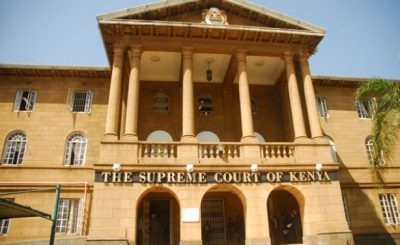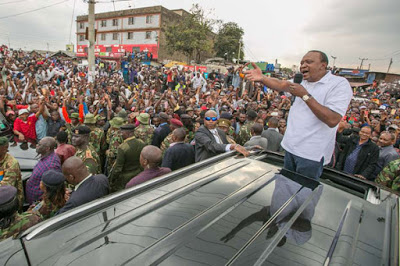Attempted Political Coup Underway in Kenya
Supreme Court in 4-2 majority nullifies August 8 presidential election

In an unprecedented legal decision four members out of seven within the Kenyan Supreme Court struck down the results of the presidential elections which were held on August 8.
Four members voted in favor of nullification, two were dissenting, while one chief justice was in hospital and did not participate in the decision.
This is the first time in Africa’s 66-year history of electoral politics where such a significant occurrence has taken place.
President Uhuru Kenyatta, 55, was declared the winner of the poll carried out less than a month ago with 54 percent of the votes counted. Former Prime Minister Raila Odinga, 72, who ran on behalf of the opposition coalition known as the National Super Alliance (NASA), garnered 44 percent.
The Supreme Court has mandated that a revote be held within 60 days. Supporters of the NASA coalition began to celebrate what they perceived as a ruling which will provide Odinga yet another opportunity to seek the highest office in the East African state.
Odinga ran for the presidency against Mwai Kibaki in 2007. Disagreements over the outcome led to internecine conflict resulting in the deaths of over a thousand people.
Later in 2013, Odinga lost to Uhuru Kenyatta by a substantial margin. Odinga’s Orange Democratic Movement (ODM) rejected the results and later filed a legal challenge in the Kenyan courts. This attempt to overturn the elections in 2013 failed.
“Unascertained” Evidence Lead to the Nullification
Perhaps the most striking aspect of the majority opinion delivered by Chief Justice Daniel Kenani Maraga was that it lacked any substantial findings documenting the claimed violations of the Kenyan constitution. The chief justice said that such proof would be presented within the next 21 days.
Therefore, with campaigning for the revote getting underway immediately, there will be a gap in the initial messaging since the basis for the nullification has not been spelled out by the majority members of the Supreme Court. President Kenyatta in a statement to the media on September 1 said that he emphatically disagreed with the decision to designate the election results invalid although he would respect and abide by the ruling.
Kenyatta said that it was:
“important to respect the rule of law even if you disagree with the Supreme Court ruling. Your neighbor will still be your neighbor, regardless of what has happened. My primary message today to every single Kenyan is peace. Let us be people of peace.”
The president referred to the four justices in Kiswahili as “wakora”, meaning crooks. He asserted that their decision was politically motivated in deciding to “cancel the elections.”
Kenya President Uhuru Kenyatta addresses crowd on Sept. 1, 2017 (Source: Abayomi Azikiwe)
Later the Jubilee party leader and president reminded Chief Justice Maraga that he was still the head-of-state in Kenya. Furthermore, Kenyatta warned his opponents within the Supreme Court that they would be monitored closely by the government.
Kenyatta asked during the press conference:
“Do you understand me? Maraga should know that he is now dealing with the serving president. We are keeping a close eye on them. But let us deal with the election first. We are not afraid.”
A summarized dissenting opinion from Justices Jackton Boma Ojwang and Njoki Susanna Ndungu laid out eight points of disagreement. Their arguments point to the failure to cite any specific instances of electoral practice which run contrary to the Kenyan constitution.
The minority summary emphasizes in point three that:
“Whereas the substance of the case founded on illegality and irregularity rests on the voting-results electronic transmission process, there is substantial information showing that, by law, the conduct of the election should have been mainly manual, and only partially electronic. Hardly any conclusive evidence has been adduced in this regard, which demonstrates such a manifestation of irregularity as to justify the invalidation of the election results.” (Standard article by Fredrick Obura, Sept. 1)
Moreover, the most revealing sections of the dissenting opinion are located in points five and six which notes:
“Much of the evidence which the majority opinion adopts is largely unascertained, apart from standing in contradiction to substantial, more credible evidence. In such a marginal state of merits in the case challenging the conduct of elections on 8th August, 2017, it is clear to me beyond peradventure, that there is not an iota of merit in invalidating the clear expression of the Kenyan people’s democratic will, which was recorded on 8th August, 2017.”
In other words it is unconscionable when four members of a high court can reverse the popular will of the millions of Kenyan voters who elected President Uhuru Kenyatta to a second term of office. The nullification of the presidential election is providing further political ammunition to the NASA coalition in their efforts to question the legitimacy of the Kenyan Independent Boundaries and Electoral Commission (IBEC). Odinga is also calling for the resignation and prosecution of the IBEC Chair Wafula Chebukati and other officials for alleged crimes committed against the people.
Moreover, this Supreme Court ruling could open up legal challenges to other office holders whom secured their positions as a result of the August 8 elections within the parliamentary and county governmental structures. Therefore, the potential for widespread destabilization utilizing the electoral process remains an ominous threat.
An article published by the Daily Nation on September 1 warned:
“The judgment by the Supreme Court on the presidential results petition has put the Independent Electoral and Boundaries Commission at the mercy of candidates who lost in the elections. Legal experts on Friday (Sept. 1) argued that Chief Justice David Maraga’s judgment will set precedence for hundreds of similar petitions at the lower courts. Lawyer Gordon Ogolla said the candidates who contested various seats were waiting to hear what the court would decide before lodging their appeals. According to Mr. Ogolla, the judgment poked holes in almost all the stages of the electoral process, giving other candidates a reason to think they lost unfairly and thus head to the court and use those grounds to protest their loss.”
International Impact of the Supreme Court Ruling
The elections were subjected to a rigorous outside monitoring process involving the African Union (AU), the United Nations, Common Market of Eastern and Southern Africa (COMESA), the Carter Center from the United States, European Union (EU), among others. These observer missions unanimously agreed that the election process was free and fair saying it represented a landmark in democratic practice for the continent.
Consequently, such a ruling by the Supreme Court has grave implications for Kenya’s relationship with the broader global community. Since the country has the largest economy in the East Africa region, this decision could impact its interactions with its neighbors as well as trading partners internationally.
After the announcement voiding the elections by the Supreme Court, volatility in the Kenyan stock market resulted in a temporary suspension of trading. Also the value of the national currency, the shilling, fell against the U.S. dollar.
Kenya has maintained an annual growth rate of five percent. The nation is largely dependent upon agricultural production, commodity export and tourism. In recent years with the discovery and exploitation of oil, prospects for exponential development are on the horizon.
According to CNN Money as it relates to the current situation:
“Observers are worried that the ruling could result in a repeat of 2007, when the country plunged into widespread violence following elections. John Ashbourne of Capital Economics estimated before the vote that a similar crisis would cut roughly three percentage points off quarterly economic growth.” (Sept. 1)
It is important to recount that in 2013, both the U.S. and Britain, the former colonial power, threatened retribution if Kenyans elected Kenyatta as president. The president and his Vice-President William Ruto were investigated by the Netherlands-based International Criminal Court (ICC) for possible trial related to events stemming from political violence during the post-election period of late 2007 and 2008.
The cases against both Kenyatta and Ruto were dropped by the ICC for lack of evidence. The ICC has almost exclusively been preoccupied with events in Africa and has failed to investigate any of the war crimes and other atrocities committed by the western imperialist countries particularly the U.S. and Britain.
During the May 2013 fiftieth anniversary summit of the Organization of African Unity (OAU), the predecessor to the AU, in Addis Ababa, Ethiopia, the AU held extensive discussions on whether to withdraw as a continental group from the Rome Statute, the ostensible legal document which underpins the validity of the ICC.
Efforts by three African states to reject the Rome Statute have been thwarted. In Gambia, a state which withdrew from its jurisdiction had its government overthrown in early in 2017.
The Republic of South Africa, whose President Jacob Zuma, announced its intentions to withdraw from the oversight of the ICC, was subjected to a Constitutional Court ruling which said that it could not implement such a policy decision absent of the passage of legislation by parliament. South African opposition forces have utilized the courts to obstruct the capacity of the African National Congress (ANC) government to enact measures which adhere to the protocols of the AU and other policy imperatives related any semblance of genuine sovereignty and national independence.
Burundi, which made a similar declaration regarding the ICC, has been largely isolated by former colonial powers and neo-colonial governments due to a domestic constitutional court ruling granting the ability of President Pierre Nkurunziza to serve for a third term. During the Pentagon-NATO war of regime-change against the North African state of Libya in 2011, the ICC began an investigation into the now deceased former leader Col. Muammar Gaddafi and other high-ranking officials within the previous government.
These events in Kenya must be viewed within the broader context of the current post-colonial political conjuncture on the African continent. Despite the existence of liberation struggles throughout the region since the post-World War II period, the imperialist states led by the U.S. remain committed to the political and economic domination of the AU member-states.


